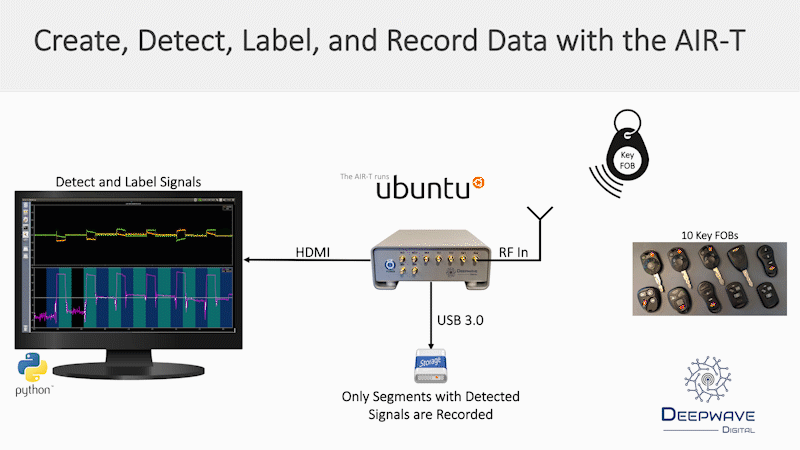Webinar: Detecting and Labeling Training Data for Signal Classification
Update
The video stream, slides, and source code are now available to the general public.
Slides
You may download the slides here.
Video Stream
Source Code
Available in the webinar section of our GitHub here.
Original Post
Deep Learning Series Part 1 of 2
Deepwave Digital will be hosting their next webinar on April 14, 2020 at 1pm EST. In this webinar, we will demonstrate how to detect and label training data for signal classification, using the cuSignal signal processing techniques learned in our previous webinar. Specifically, you will learn how to leverage GPU signal processing and the AIR-T to detect, label, and record training data from various key FOBs over-the-air. cuSignal is part of the NVIDIA RAPIDS development environment and is an effort to GPU accelerate all of the signal processing functions in the SciPy Signal Library.
When: April 14th, 2020 at 1pm EST
Register Here
Space is limited so make sure to register in advance. Read below for more information about the webinar and we hope you will join us!
Deepwave Digital, Inc.
Webinar Agenda
Introduction to Deepwave Digital
We will introduce you to the Deepwave Digital team and provide an overview of what our startup does. We will also discuss the way we see deep learning being applied to systems and signals.
AirStack Programming API for the AIR-T
We will provide a detailed review of AirStack, the application programming interface (API) for the AIR-T. The figure below outlines the CPU, GPU, and deep learning interfaces supported.

Demonstrations
Key FOB Signals for Labeling
We will create a training data set using an assortment of different key FOBs. These data will be added to our AirPack software package in an upcoming release.
Designing a Real-time Power Detector with cuSignal for the AIR-T
In this section, we will walk the attendees through the real-time python code to:
- Compute the instantaneous power of the signal stream
- Filter and down-sample the power to a lower data rate
- Reshape the down-sampled data into detection segments
- Perform detection on each segment of the down-sampled data
- Display the detected data (if desired)
- Record the data to disk for deep learning training
Real-time Signal Detection and Labeling
Here we will demonstrate how to first execute the software to detect, label, and record the signal from the key FOBs, then over-the-air capture these data. An example of this is shown in the video below with recorded sections in blue/aqua.

When: March 25th 2020 at 1pm EST